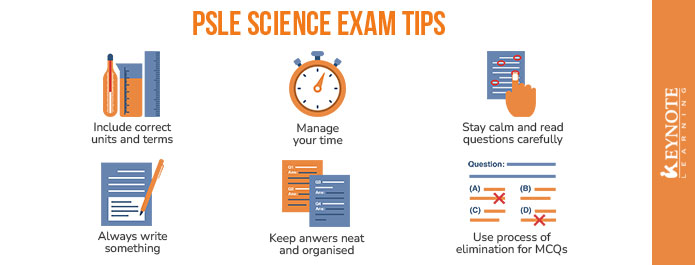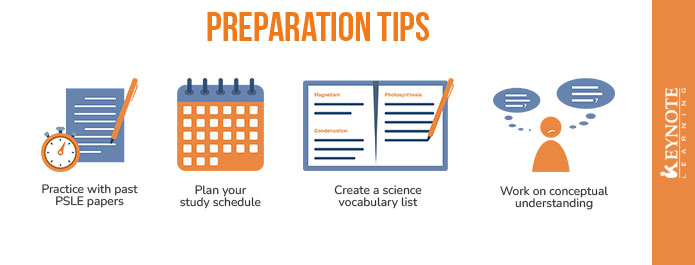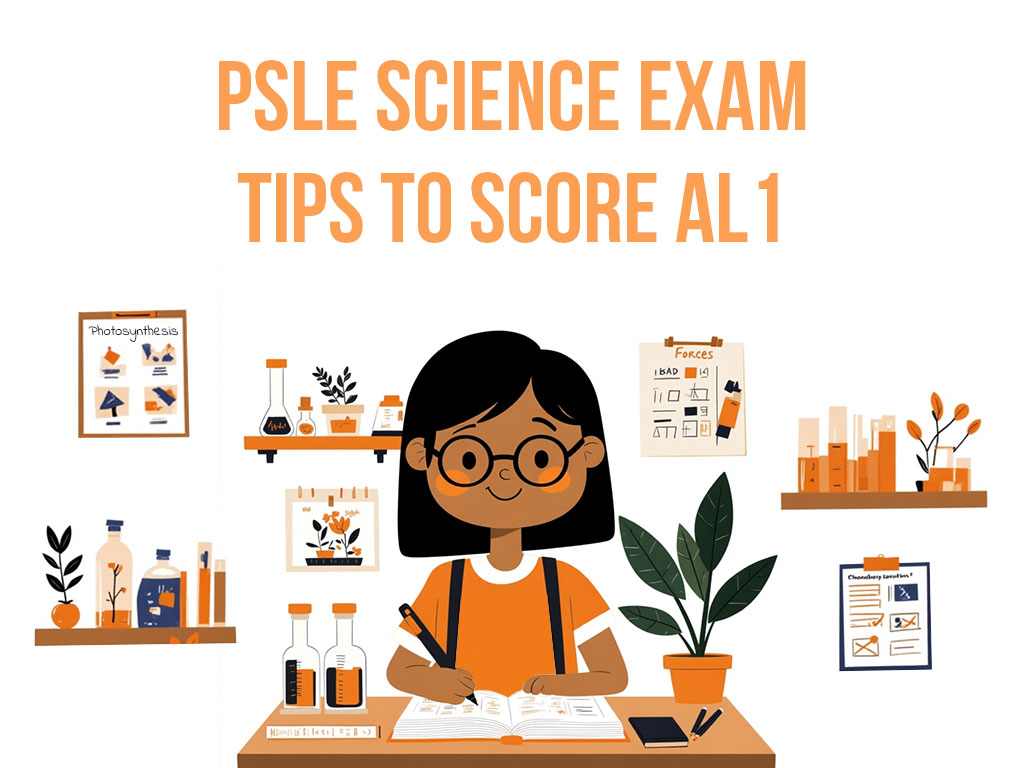The PSLE Science exam is a key milestone for Primary 6 students, impacting their secondary school options. Many students find the science subject challenging due to its combination of memorisation, understanding, and application of concepts.
Getting AL1 is achievable with the right preparation. This article offers 11 practical and updated PSLE Science exam tips to help you feel confident!
PSLE Science Exam Tips

1. Include correct units and terms
Whenever you write measurements or quantities, use the proper units (for example, “cm”, “°C”, “g”) and science terms. This shows precision and a clear understanding.
Many students lose easy marks by forgetting units or incorrectly rounding during exams. Train yourself to include them every time you do your homework—this builds a strong habit, so it becomes second nature even under exam pressure.
2. Manage your time well
You have 1 hour 45 minutes for the exam. Aim to spend a maximum of 45 minutes on Booklet A (Multiple Choice Questions / MCQs) and spend the rest of the time on Booklet B (Open-Ended Questions). Allocate more time to questions with higher marks, and skip challenging ones to revisit later—this helps ensure you finish the paper on time.
During practice, however, don’t rush. Focus on accuracy by using the correct keywords and scientific terms in your answers. Building strong habits during practice improves both speed and precision in the actual exam.
3. Stay calm and read each question carefully
Read each question slowly, at least twice, and underline or circle the keywords (such as “explain”, “not”, or “except”) that tell you what to do.
However, if you encounter an unfamiliar question, stay calm. Take a deep breath, avoid overthinking, move on, and return later. After finishing the paper, you can try recalling related science concepts or methods to obtain the accurate solution.

Helpline for PSLE Science Students!
All Keynote Learning Science students (P3-P6) get access to our special homework helpline (aka the Atom Group).
Send us your science questions and answers (from tuition, school, or self-practice), and our tutors will guide you on how your answers can be improved.
4. Always write something
Never leave a question blank. Even if you're unsure of the full answer, writing down what you do know—such as keywords, concepts, or related facts, can earn you partial marks.
Examiners look for evidence of understanding, so a good attempt is always better than no response. Sometimes, recalling just one correct term or explaining your thinking logically can make the difference. Do not need to worry too much about Keywords. Ensure you have written your logic and reason as clearly as possible. (Added by Linus)
5. Keep answers neat and organised
Write clearly and structure your answers so that each point is easy to read and understand. Examiners are more likely to award marks when your responses are well-presented and logically ordered.
Messy handwriting or jumbled ideas can confuse, leading to missed marks, even if the answer is technically correct. Take a moment to plan longer answers and leave space between points to avoid copying or alignment errors.
6. Use the process of elimination for MCQs
When you're unsure of an answer, start by ruling out the clearly incorrect options. This narrows down your choices and increases your chances of choosing the correct one.
Even if you're not fully confident, an educated guess based on what you do know is better than leaving it blank. Often, this answering technique of eliminating just one or two wrong answers can help you make a more informed guess.
PSLE Science Preparation Tips

1. Practice with past-year exam papers
Test yourself with past-year papers under timed conditions to get used to the exam format and build your time management skills. After each practice, carefully check your answers and learn from any mistakes.
Don’t just move on—clarify your doubts and try the same questions again a week later to see if you've truly understood and improved. This spaced revision helps strengthen long-term memory and boosts exam confidence.
2. Plan your study schedule
Create a study plan using a calendar or checklist to cover all topics in the PSLE Science syllabus. Start with the harder topics first and revisit your weaker areas more often. Keynote’s in-house ThinkInn.xyz system can help you do so as it promotes self-paced learning!
In the final month before the exam, focus more on doing than reading. More practice with past-year papers can strengthen your ability to apply scientific knowledge, not just memorise facts. Review model answers, correct your mistakes, and pay attention to whether you have missed out any components in your answers compared to the model answers.

Get On-Demand Recap. Anytime, Anywhere.
Keynote Learning students get FREE access to ThinkInn! Enjoy 24/7 access to exclusive in-house video resources and revision materials designed to help you tackle your upcoming O Level English exams.
3. Create a science vocabulary list
Create your own list of key scientific terms and review it regularly. Understanding and correctly using these terms helps you answer questions clearly, accurately, and to the point.
Make it a habit to add new terms as you study and practise. You should be able to recognise the concept being tested and recall the correct terminology quickly. At Keynote Learning, we always remind students: Be specific. Use the right words. Clear, accurate answers start with strong vocabulary.
4. Work on a deeper understanding of scientific concepts
To do well in PSLE Science, it’s not enough to just memorise facts—you need to understand the why and how behind each concept. A strong grasp of scientific ideas allows you to apply them to different situations, including unfamiliar or real-life scenarios often tested in exams.
Instead of just recalling definitions, aim to explain key concepts in your own words and understand how they connect. This deeper understanding helps you solve challenging questions with confidence and accuracy. Remember: it’s not about how much you remember, but how well you use what you know.
Scoring AL1 in PSLE Science with Keynote Learning

At Keynote Learning, our teachers are dedicated to making science both engaging and easy to understand. Through clear explanations and creative teaching methods, we help students dive deep into the subject while nurturing their curiosity and love for learning.
To support your child, our Homework Helpline (Atom Chat) is available for all P3-P6 students. Students can send us their science questions—whether from tuition, school, or self-practice—and receive personalised guidance on how to improve their answers.
All Keynote students also get FREE access to our ThinkInn virtual learning platform, which allows students (whether they’re in primary or secondary schools) to revisit key lessons anytime! This helps them prepare effectively for tests and exams at their own pace, encouraging independent and confident learning.
Looking for structured support for your child’s upcoming PSLE science examination paper? Explore our PSLE Science Tuition to learn how we can help your child master good answering techniques and achieve better exam results!

